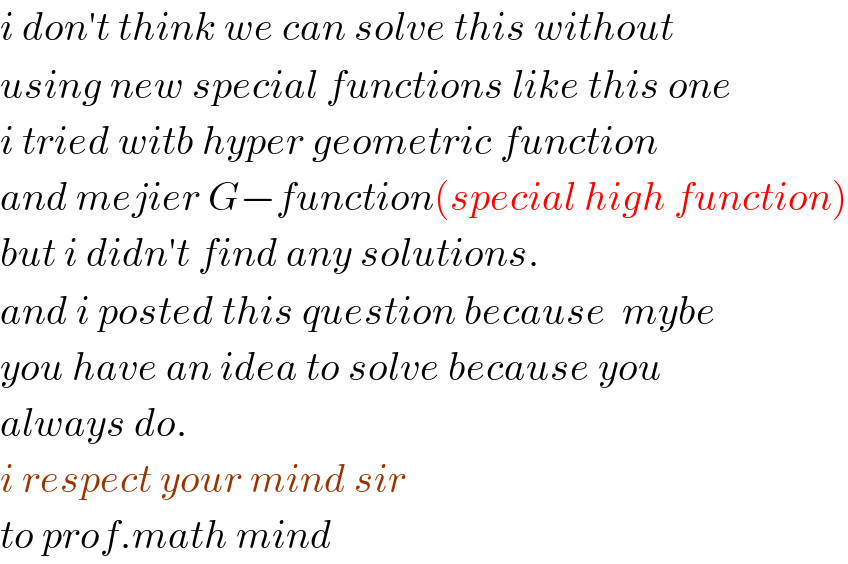
Question and Answers Forum
Question Number 98151 by M±th+et+s last updated on 11/Jun/20
![∫e^(x^5 +8x^2 ) dx =((√π)/(4(√2)))e^x^5 erfi(2(√2)x)−((5(√π))/(4(128)(√2)))(super−erf_((hyper)) (2(√2)x))+c where[super−erf_((hyper)) (t)] is super−function in D_2 and [D_n ]](Q98151.png)
Answered by maths mind last updated on 12/Jun/20

Commented by M±th+et+s last updated on 12/Jun/20

Answered by M±th+et+s last updated on 12/Jun/20
![I=∫e^(x^5 +8x^2 ) dx ∫e^x^5 e^(8x^2 ) dx { ((u(x)=e^x^5 du=5x^4 e^x^5 )),((dv=e^(8x^2 ) v=(1/4)(√(π/2))erfi(2(√2)x))) :} where erfi(y) is the imaginary eror function I=((√π)/(4(√2))) e^x^5 erfi(2(√2)x)−((5π)/(4(√2)))∫x^4 e^x^5 erfi(2(√2)x)dx...✠ I_1 =∫x^4 e^x^5 erfi(2(√2)x)dx;let 2(√2)x=u dx=(1/(2(√2)))dy I_1 =(1/(128(√2)))∫y^4 e^((1/(128(√2)))y^5 ) erfi(y)dy=r∫y^4 e^(ry^5 ) erfi(y) dy ;(r=(1/(128(√2)))∈R) but erfi(y)=(i/(√π))Σ_(k=0) ^∞ (((−1)^(k−1) .H_(2k+i) (iy))/(2^(3k+(1/2)) .k!(2k+1)))and J=∫y^n .e^(ry) .erfi(y)dy J=((−n!)/(√π))(−r)^(−(n+1)) exp(((−r^2 )/4)).Σ_(m=0) ^n (((−r)^m )/(m!)).Σ_(k=0) ^m ((m),(k) )(((−r)/2))^(m−k) ((r/2)+y)^(k+1) .[(−((r/2)+y)^2 +y)^2 ]^2 .Γ(((k+1)/2);−((r/2)+y)^2 ] −r^(−(n+1)) .erfi(y)Γ(A+1,ny) n∈N so ⇒⇒Γ(n+1,ry);n∈N super integrative conversion T^(super−T^(−1) ) [∫y^4 e^(ry^5 ) erfi(y)dy]=d(super−erf_(hyper) (y)) then I_1 =r∫y^4 e^(ry^5 ) erfi(y)dy=r∫d(super−erf_(hyper) (y)) I_1 =r super−erf_((hyper)) (y)+c=(1/(128(√2)))super−erf_((hyper)) (2(√2)x)+c so I=((√π)/(4(√2)))e^x^5 erfi(2(√2)x)−((5(√π))/(4(128)(√2)))[super−erf_(hyper) (2(√2)x)]+c](Q98230.png)
| ||
Question and Answers Forum | ||
Question Number 98151 by M±th+et+s last updated on 11/Jun/20 | ||
![∫e^(x^5 +8x^2 ) dx =((√π)/(4(√2)))e^x^5 erfi(2(√2)x)−((5(√π))/(4(128)(√2)))(super−erf_((hyper)) (2(√2)x))+c where[super−erf_((hyper)) (t)] is super−function in D_2 and [D_n ]](Q98151.png) | ||
Answered by maths mind last updated on 12/Jun/20 | ||
 | ||
| ||
Commented by M±th+et+s last updated on 12/Jun/20 | ||
 | ||
Answered by M±th+et+s last updated on 12/Jun/20 | ||
![I=∫e^(x^5 +8x^2 ) dx ∫e^x^5 e^(8x^2 ) dx { ((u(x)=e^x^5 du=5x^4 e^x^5 )),((dv=e^(8x^2 ) v=(1/4)(√(π/2))erfi(2(√2)x))) :} where erfi(y) is the imaginary eror function I=((√π)/(4(√2))) e^x^5 erfi(2(√2)x)−((5π)/(4(√2)))∫x^4 e^x^5 erfi(2(√2)x)dx...✠ I_1 =∫x^4 e^x^5 erfi(2(√2)x)dx;let 2(√2)x=u dx=(1/(2(√2)))dy I_1 =(1/(128(√2)))∫y^4 e^((1/(128(√2)))y^5 ) erfi(y)dy=r∫y^4 e^(ry^5 ) erfi(y) dy ;(r=(1/(128(√2)))∈R) but erfi(y)=(i/(√π))Σ_(k=0) ^∞ (((−1)^(k−1) .H_(2k+i) (iy))/(2^(3k+(1/2)) .k!(2k+1)))and J=∫y^n .e^(ry) .erfi(y)dy J=((−n!)/(√π))(−r)^(−(n+1)) exp(((−r^2 )/4)).Σ_(m=0) ^n (((−r)^m )/(m!)).Σ_(k=0) ^m ((m),(k) )(((−r)/2))^(m−k) ((r/2)+y)^(k+1) .[(−((r/2)+y)^2 +y)^2 ]^2 .Γ(((k+1)/2);−((r/2)+y)^2 ] −r^(−(n+1)) .erfi(y)Γ(A+1,ny) n∈N so ⇒⇒Γ(n+1,ry);n∈N super integrative conversion T^(super−T^(−1) ) [∫y^4 e^(ry^5 ) erfi(y)dy]=d(super−erf_(hyper) (y)) then I_1 =r∫y^4 e^(ry^5 ) erfi(y)dy=r∫d(super−erf_(hyper) (y)) I_1 =r super−erf_((hyper)) (y)+c=(1/(128(√2)))super−erf_((hyper)) (2(√2)x)+c so I=((√π)/(4(√2)))e^x^5 erfi(2(√2)x)−((5(√π))/(4(128)(√2)))[super−erf_(hyper) (2(√2)x)]+c](Q98230.png) | ||
| ||